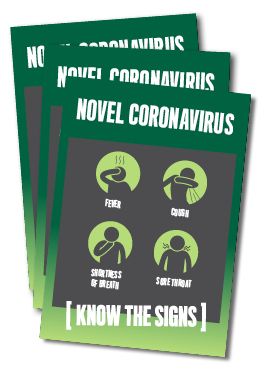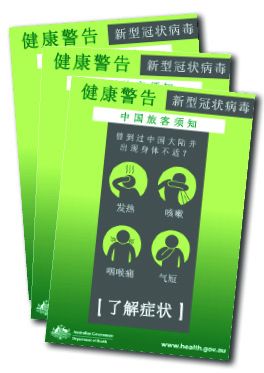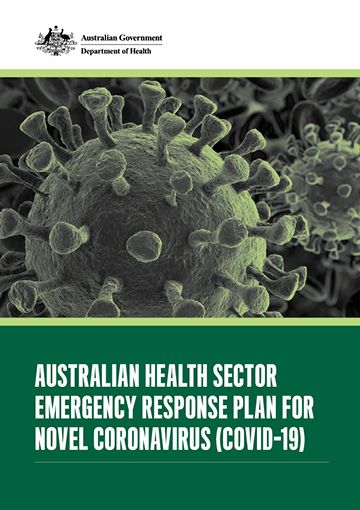Coronavirus (COVID-19) health alert
We are monitoring the respiratory illness outbreak caused by coronavirus (COVID-19). We update this alert every day with the latest medical advice and official reports.
Current status
In Australia
As at 11:00 hrs on 10 March 2020, we have 100 confirmed cases of coronavirus (COVID-19), including 3 deaths, in Australia.
- 54 in New South Wales
- 12 in Queensland
- 6 in South Australia
- 2 in Tasmania
- 12 in Victoria
- 4 in Western Australia
- 10 associated with the Diamond Princess cruise ship
Further details:
- 15 of the initially reported cases in Australia all had a direct or indirect travel history to Wuhan, China
- 10 cases, including 1 death, are associated with the Diamond Princess cruise ship repatriation flight from Japan
- 18 cases are reported to have had a direct or indirect travel history to Iran
- 27 cases are reported to have had a travel history to countries including Singapore, the United States of America, the United Arab Emirates, the United Kingdom, Italy, Iceland, Japan, the Republic of Korea, Thailand, the Philippines, Cuba, Indonesia, Nepal and Taiwan
- 27 cases, including 2 deaths, do not have a reported history of overseas travel
- 8 of these cases are associated with an aged care facility in NSW. 2 residents of this facility have sadly died
- 2 cases are either directly or indirectly associated with attendance at a workshop
- 14 cases are close contacts of known cases, with further details pending
- 3 cases are under investigation, with further details pending
- The likely place of exposure for a further 3 newly reported cases is under investigation
Of the 100 Australian cases reported, 22 of these cases are reported to have recovered.
For questions about testing or the welfare of people with the virus, contact your state or territory health authority.
In the news
The Department of Foreign Affairs and Trade (DFAT) has updated advice on cruise travel:
- Australians, particularly those with underlying health concerns should reconsider taking an overseas cruise at this time due to COVID-19. If in doubt, consult a medical professional before travelling
- repatriation from cruise ships affected by COVID-19 should not be relied upon as an option
The Australian Government has secured additional surgical, P2 and N95 masks for the National Medical Stockpile, for medical and aged care professionals to care for patients with suspected or confirmed cases of COVID-19.
The Prime Minister has announced the activation of the National Coordination Mechanism. The mechanism will coordinate activities across the Commonwealth, state and territory governments as well as industry to ensure a consistent national approach is taken to provide essential services across a range of critical sectors and supply chains.
The Australian Government has committed to a 50-50 shared health funding deal with the states and territories to ensure a rapid health response to the evolving COVID-19 (coronavirus) outbreak.
The Prime Minister has announced the activation of the Australian Health Sector Emergency Response Plan for Novel Coronavirus (COVID-19).
Read the latest travel restrictions.
For more information, read the latest transcripts and media releases from our Chief Medical Officer and our Deputy Chief Medical Officer about coronavirus (COVID-19) in our news section.
You can also see updates in media releases and transcripts from Minister Hunt relating to coronavirus on the Health Ministers' site.
Across the world
Across the world, there have been more than 113,000 confirmed cases of coronavirus (COVID-19) and more than 3,900 reported deaths.
The majority of cases and deaths associated with COVID-19 have been reported from mainland China.
There have been more than 32,000 cases, including approximately 850 deaths, reported from 108 countries and regions outside mainland China. The majority of deaths outside mainland China have been in Italy and Iran.
Of confirmed cases reported globally, the case fatality rate is approximately 3.9%. The case fatality rate in countries and regions outside mainland China is approximately 2.4%.
The majority of new cases are reported from Republic of Korea, Italy and Iran.
If you’re planning any overseas travel, or have returned from an at risk country, see and follow the travellers and visitors information below.
Why is there an alert
On 30 January 2020, the World Health Organization declared the coronavirus outbreak a Public Health Emergency of International Concern.
On 27 February 2020, the Prime Minister announced the activation of the ‘Australian Health Sector Emergency Response Plan for Novel Coronavirus (COVID-19)'.
Learn more about coronavirus (COVID-19)
Find out more about coronavirus (COVID-19) and how to protect yourself.
Separate fact from fiction by reading coronavirus myth busters on the World Health Organization website. This includes information about when and how to wear a surgical mask.
We also have a series of information sheets to help you, your family, health professionals, aged care workers, educational facilities, and the travel industry.
Coronavirus (COVID-19) resources
A collection of resources for the general public, health professionals and industry about coronavirus (COVID-19), including translated resources.
Coronavirus (COVID-19) resources in Simplified or Traditional Chinese
A collection of resources about coronavirus (COVID-19) in Simplified or Traditional Chinese.
Coronavirus (COVID-19) resources in Farsi
A collection of resources about coronavirus (COVID-19) in Farsi.
Coronavirus (COVID-19) resources in Korean
A collection of resources about coronavirus (COVID-19) in Korean.
Coronavirus (COVID-19) resources in Italian
A collection of resources about coronavirus (COVID-19) in Italian.
Information for the health sector
View our resources for health professionals, including pathology providers and healthcare managers.
Also read the 2019-nCoV National Guidelines for Public Health Units that are regularly updated by the Communicable Diseases Network Australia (CDNA).
Read the Chief Medical Officer Professor Brendan Murphy's letter to doctors about the COVID-19 outbreak and the Commonwealth’s support for the central role doctors play in our national response.
Read the joint statement from the Minister for Aged Care and Senior Australians, Minister Colbeck, and Australian Chief Medical Officer, Professor Brendan Murphy, about ensuring the delivery of safe, quality care to senior Australians.
For information about the epidemiology of cases in Australia and overseas, read the weekly epidemiological reports.
Australian Health Sector Emergency Response Plan for Novel Coronavirus (COVID-19)
The Australian Health Sector Emergency Response Plan for Novel Coronavirus (the COVID-19 Plan) was endorsed by the AHPPC on 17 February 2020.
The Australian Government will continue to monitor the emerging information and evidence closely. It will work with jurisdictions, through key committees and other relevant experts, to adapt the COVID-19 Plan as new information becomes available.
Australian Health Sector Emergency Response Plan for Novel Coronavirus (COVID-19)
The Australian Health Sector Emergency Response Plan for Novel Coronavirus (the COVID-19 Plan) guides the Australian health sector response.
If you are at risk
In Australia, the people most at risk of getting the virus are those who have recently been in in a high risk country/region and people who have been in close contact with someone who has a confirmed case of coronavirus.
If you have returned from a country or region that is at higher risk for COVID-19, you can not attend work if you work in a setting with vulnerable people.
From previous experience with other coronaviruses, other categories of people at most risk of serious infection are:
- people with compromised immune systems (e.g. cancer)
- elderly people
- Aboriginal and Torres Strait Islander people
- people with diagnosed chronic medical conditions
- very young children and babies*
- people in group residential settings
- people in detention facilities
*At this stage, the risk to children and babies, and the role children play in the transmission of COVID-19, is not clear. However, there has so far been a low rate of confirmed COVID-19 cases among children relative to the broader population.
Travellers and visitors
On 5 March 2020, the Australian Government extended existing travel restrictions to include the Republic of Korea. All travel restrictions will be reviewed again before 13 March 2020.
As part of our ongoing strategy of containment and minimising risk to the Australian community, we are implementing additional screening of passengers at Australian airports.
Australian Border Force liaison officers at overseas airports will work with airlines to identify travellers who should not board.
Airlines will also be required to refuse uplift for anyone identified as being unwell.
Any passengers identified as unwell on the flight will be identified and referred for further assessment upon arrival.
DFAT has advised Australians, particularly those with underlying health concerns, to reconsider taking an overseas cruise at this time due to COVID-19.
Higher risk
The Australian Government considers the following countries to be at higher risk for COVID-19:
- Mainland China
- Iran
- Italy
- Republic of Korea
There are travel restrictions for travellers from mainland China, Iran and Republic of Korea.
If you are returning from mainland China or Iran you should isolate yourself for 14 days after leaving mainland China or Iran.
If you are travelling from the Republic of Korea, on or after 5 March, you must isolate yourself for 14 days from the time you left the Republic of Korea.
If you are arriving in Australia from Italy, you must present for health screening at the border as directed. Unless you are instructed to, you do not need to isolate at home.
If you work as a healthcare worker or as a residential aged care worker, you cannot attend work for 14 days after leaving Italy.
This advice should be read in conjunction with the ‘What you need to know’ and ‘Isolation guidance’ information sheets.
Moderate risk
The Australian Government considers the following countries to be at moderate risk for COVID-19:
- Cambodia
- Hong Kong
- Indonesia
- Japan
- Singapore
- Thailand
If you have recently travelled to these countries, monitor your health for 14 days after leaving that country. If you develop a fever or cough, seek medical advice urgently and isolate yourself.
Travel advice
The Department of Foreign Affairs and Trade (DFAT) has raised the level of advice for:
- Italy
- Iran
- Japan
- Republic of Korea (Daegu and Cheongdo)
- Mainland China
- Mongolia
Australians travelling overseas are encouraged to regularly review the Smartraveller website and subscribe for updates.
China, Iran and Republic of Korea
Do not travel to mainland China, Iran and Daegu (Republic of Korea). This is the latest China travel advice, Iran travel advice and Daegu travel advice from DFAT.
For Australians already in Iran, DFAT recommends travellers depart while commercial operations are available.
Foreign nationals (excluding permanent residents) who are in mainland China, will not be allowed to enter Australia until 14 days after they have left or transited through mainland China.
Foreign nationals (excluding permanent residents) who left Iran on or after 1 March, will not be allowed to enter Australia until 14 days after they have left or transited through Iran.
Foreign nationals (excluding permanent residents of Australia) who are in the Republic of Korea on or after 5 March 2020 will not be allowed to enter Australia for 14 days from the time they have left or transited through the Republic of Korea.
Australian citizens, permanent residents, and their immediate family (including spouses, dependants and legal guardians) will still be able to enter Australia but will be required to isolate themselves for 14 days after the date they left China, Iran or the Republic of Korea.
If you:
- hold a visa for Australia or have applied for a visa, read the coronavirus fact sheet for visa holders and applicants
- are planning to travel to or transit through Australia, read the current travel restrictions
- plan to travel overseas, check the latest travel advice
- are concerned about someone overseas, call the DFAT consular emergency line
If you are on board an international flight and show signs of an infectious disease:
- the airline must report you to biosecurity officers
- biosecurity officers will assess you before you get off the plane
- you may be isolated or referred to a hospital
Australians on cruise ships
DFAT is providing consular assistance to Australians hospitalised and quarantined overseas because of COVID-19.
Grand Princess Cruise Ship
DFAT is waiting on advice on whether any of the four Australians on board the Grand Princess cruise ship, moored off the Californian coast, have contracted COVID-19.
The Australian Consulate-General in San Francisco stands ready to provide consular assistance to Australian citizens on board.
International students
Year 11 and 12 students
Year 11 and 12 students who remain in China (outside Hubei Province) due to Australian travel restrictions have been offered a strict pathway to resume their studies. This is in recognition of the importance of the final 2 years of school.
Students who are completing their senior secondary schooling can apply for an exemption to the 1 February 2020 COVID-19 travel restrictions applied to foreign nationals who have been in mainland China (except Hubei Province). The exemptions will be considered on a case by case basis.
Australian Border Force has information for student visa holders.
We are delivering more Australian education services online and offshore for international students. To find out more and for support, go to coronavirus updates for international students on the Study in Australia website.
What we are doing
Australia is well prepared.
Our first class health system includes mechanisms for early detection and effective management of cases and contacts. Our plans include a range of interventions to minimise transmission and mitigate the impact of the outbreak.
Australian Government agencies and state and territory governments are working together to coordinate an evidence-based response. This includes:
- applying travel restrictions to reduce the number of travellers from mainland China, Iran and the Republic of Korea
- applying a 14-day isolation period to people at risk of getting coronavirus
- continuing to screen travellers who arrive in Australia
- tracing coronavirus cases
- continuing with border surveillance
- providing information in English and Chinese based on the latest medical advice, including through Facebook, Twitter, Weibo, WeChat and Chinese newspapers
- applying enhanced border measures at international air and sea ports, including announcements and signs
P2 and surgical masks have been made available from the National Medical Stockpile as part of the Government’s response to COVID-19. The Government is also investigating further sources of supply for personal protective equipment, both internationally and domestically.
State and territory health authorities are:
- testing anyone who shows symptoms of the virus
- monitoring close contacts of confirmed cases every day
Find out more
You can also visit our Facebook and Twitter pages or call us if you still have questions about coronavirus:
Coronavirus Health Information Line
Call this line if you are seeking information on novel coronavirus. The line operates 24 hours a day, seven days a week.
Departmental media enquiries
Contact for members of the media







